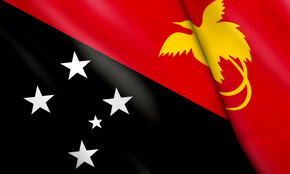 Parliamentary elections, held every five years, are scheduled to begin June 23 in the tiny independent Asia-Pacific state of Papua New Guinea, 9,000 air miles from New York City.
Parliamentary elections, held every five years, are scheduled to begin June 23 in the tiny independent Asia-Pacific state of Papua New Guinea, 9,000 air miles from New York City.While European, North and South American countries are embroiled in their own politics, 4.6 million of the world's poorest residents are registered to vote in New Guinea. Many subsist on less than $1.25 per day. New Guinea's 6.3 million inhabitants are spread over 176,000 square miles in Oceania.
Oceania occupies the eastern half of the island of New Guinea and numerous offshore islands (the western portion of the island is a part of the Indonesian provinces of Papua and West Papua). It is located in the southwestern Pacific Ocean, in a region defined since the early 19th century as Melanesia. The capital is Port Moresby
So much for the geography lesson.
At stake in the June 23 elections are 111 parliamentary seats. Each member serves for five years. Fighting for power are Prime Minister Peter O'Neill and Governor General Michael Ogio.
It's an unusual fight. The titular chief of state is 86-year-old Queen Elizabeth II who is celebrating her 60th year at London's Buckingham Palace. After being ruled by three external powers since 1884, Papua New Guinea gained its independence from Australia in 1975. It remains a Commonwealth realm of Her Majesty Elizabeth II, Queen of Papua New Guinea
In New Guinea, the Queen is represented by Ogio. But the Prime Minister is appointed by the governor-general. The previous governor-general, Sir Michael Somare, retired in May of this year at age 76. Ogio took his place
Try to figure.
Since mid-2011, there has been an ongoing dispute between parliament and O'Neill and the judiciary. The crisis involved the status of the prime minister and who is the legitimate head of government.
In the last parliamentary election in 2007, Somare's National Alliance Party (NA) won 27 seats. O'Neill's People's National Congress Party gained only four seats.
A stand-off late last year between O'Neill and Somare resulted in the country briefly having two prime ministers, two governors-general, two cabinets and two police commissioners.
Somare was backed by the Supreme Court. O'Neill gained the support of a majority of the parliament, the Army and the civil service. O'Neill was internationally recognized as holding the office of prime minister.
At least the political battles aren't reverting to the days when such disputes in the country were settled with cannibalistic rites. True. Wikipedia reports:
"Although headhunting and cannibalism have been practically eradicated, in the past they occurred in many parts of the country as part of ritual practices.
"For example, in 1901, on Goaribari Island in the Gulf of Papua, a missionary, Harry Dauncey, found 10,000 skulls in the island's Long Houses.
"According to the writer Marianna Torgovnick, "The most fully documented instances of cannibalism as a social institution come from New Guinea, where head-hunting and ritual cannibalism survived, in certain isolated areas, into the fifties, sixties and seventies, and still leave traces within certain social groups.."
And you thought the current political presidential campaign in the U.S. was beginning to sound nasty. Heads up.

 By
By 